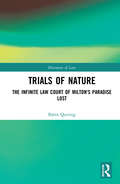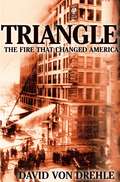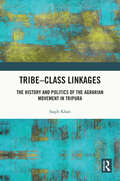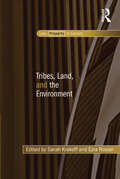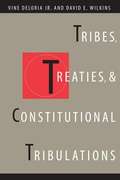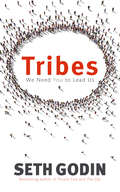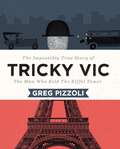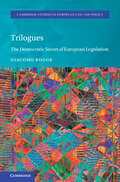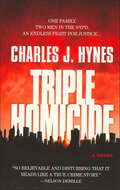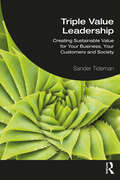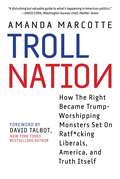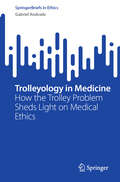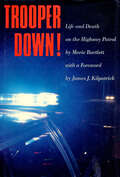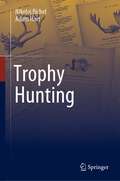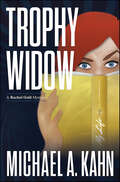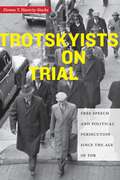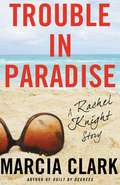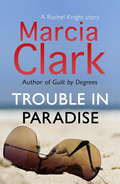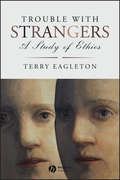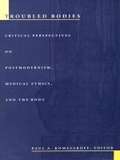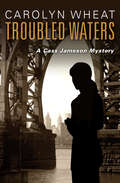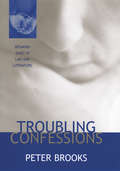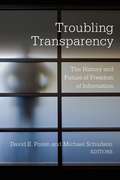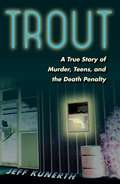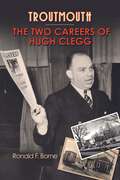- Table View
- List View
Trials of Nature: The Infinite Law Court of Milton's Paradise Lost
by Björn QuiringFocusing on John Milton’s Paradise Lost , this book investigates the meta-phorical identifi cation of nature with a court of law – an old and persistent trope, haunted by ancient aporias, at the intersection of jurisprudence, phi-losophy and literature. In an enormous variety of texts, from the Greek beginnings of Western literature onward, nature has been described as a courtroom in which an all- encompassing trial takes place and a universal verdict is executed. The first, introductory part of this study sketches an overview of the metaphor’s development in European history, from antiquity to the seventeenth century. In its second, more extensive part, the book concentrates on Milton’s epic Paradise Lost in which the problem of the natural law court finds one of its most fascinating and detailed articulations. Using conceptual tools provided by Hannah Arendt, Walter Benjamin, Hans Blumenberg, Gilles Deleuze, William Empson and Alfred North Whitehead, the study demonstrates that the conflicts in Milton’s epic revolve around the tension between a universal legal procedure inherent in nature and the positive legal decrees of the deity. The divine rule is found to consolidate itself by Nature’s supple-mentary shadow government; their inconsistencies are not flaws, but rather fundamental rhetorical assets, supporting a law that is inherently “double- formed”. In Milton’s world, human beings are thus confronted with a twofold law that entraps them in its endlessly proliferating double binds, whether they obey or not. The analysis of this strange juridical structure can open up new perspectives on Milton’s epic, as well as on the way legal discourse tends to entangle norms with facts and thus to embed itself in human life. This original and intriguing book will appeal not only to those engaged in the study of Milton, but also to anyone interested in the relationship between law, history, literature and philosophy.
Triangle: The Fire That Changed America
by David Von Drehle<P>Exciting historically accurate narative of the Triangle fire and analysis of how it influenced the rise of labor unions, in addition to social and political reform in America. <P><b>A New York Times Bestseller</b>
Tribe-Class Linkages: The History and Politics of the Agrarian Movement in Tripura
by Saqib KhanThis book is a historical study of the development of agrarian class relations among the tribal population in Tripura. Tracing the evolution of Tripura and its agrarian relations from monarchy in the nineteenth century to democracy in the twentieth century, the book discusses the nature of the erstwhile princely state of Tripura, analyses the emergence of differentiation within tribes, and documents the emergence of the tribal movement in the state. It specifically focuses on the tribal movement led by the Ganamukti Parishad, beginning with the historic revolt of 1948-51 against state repression on the tribal people, followed by the mass movements in the 1950s and 1960s, which were founded on a recognition of class relations and the slogan of unity across the tribal and non-tribal (Bengali) peasantry. The first of its kind, the book will be indispensable for students and researchers of tribal studies, agrarian studies, exclusion studies, tribe-class relationships, minority studies, sociology, development studies, history, political science, north-east India studies, and South Asian studies. It will also be useful for activists and policymakers working in the area.
Tribes, Land, and the Environment (Law, Property and Society)
by Sarah KrakoffLegal and environmental concerns related to Indian law and tribal lands remain an understudied branch of both indigenous law and environmental law. Native American tribes have a far more complex relationship with the environment than is captured by the stereotype of Indians as environmental stewards. Meaningful tribal sovereignty requires that non-Indians recognize the right of Indians to determine their own relationship to the land and the environment. But tribes do not exist in a vacuum: in fact they are deeply affected by off-reservation activities and, similarly, tribal choices often have effects on nearby communities. This book brings together diverse essays by leading Indian law scholars across the disciplines of indigenous and environmental law. The chapters reveal the difficulties encountered by Native American tribes in attempts to establish their own environmental standards within federal Indian law and environmental law structures. Gleaning new insights from a focus on tribal land and property law, the collection studies the practice of tribal sovereignty as experienced by Indians and non-Indians, with an emphasis on the development and regulatory challenges these tribes face in the wake of climate change. This volume will advance the reader's knowledge and understanding of these challenging issues.
Tribes, Treaties, and Constitutional Tribulations
by David E. Wilkins Vine Deloria Jr."Federal Indian law . . . is a loosely related collection of past and present acts of Congress, treaties and agreements, executive orders, administrative rulings, and judicial opinions, connected only by the fact that law in some form has been applied haphazardly to American Indians over the course of several centuries. . . . Indians in their tribal relation and Indian tribes in their relation to the federal government hang suspended in a legal wonderland. " In this book, two prominent scholars of American Indian law and politics undertake a full historical examination of the relationship between Indians and the United States Constitution that explains the present state of confusion and inconsistent application in U. S. Indian law. The authors examine all sections of the Constitution that explicitly and implicitly apply to Indians and discuss how they have been interpreted and applied from the early republic up to the present. They convincingly argue that the Constitution does not provide any legal rights for American Indians and that the treaty-making process should govern relations between Indian nations and the federal government.
Tribes: We need you to lead us
by Seth GodinIn this fascinating book, Seth Godin argues that now, for the first time, everyone has an opportunity to start a movement - to bring together a tribe of like-minded people and do amazing things. There are tribes everywhere, all of them hungry for connection, meaning and change. And yet, too many people ignore the opportunity to lead, because they are "sheepwalking" their way through their lives and work, too afraid to question whether their compliance is doing them (or their company) any good. This book is for those who don't want to be sheep and instead have a desire to do fresh and exciting work. If you have a passion for what you want to do and the drive to make it happen, there is a tribe of fellow employees, or customers, or investors, or readers, just waiting for you to connect them with each other and lead them where they want to go.
Tricky Vic: The Impossibly True Story of the Man Who Sold the Eiffel Tower
by Greg PizzoliA New York Times Book Review Best Illustrated Children's Book of 2015In the early 1900s, Robert Miller, a.k.a. &“Count Victor Lustig,&” moved to Paris hoping to be an artist. A con artist, that is. He used his ingenious scams on unsuspecting marks all over the world, from the Czech Republic, to Atlantic ocean liners, and across America. Tricky Vic pulled off his most daring con in 1925, when he managed to "sell" the Eiffel Tower to one of the city&’s most successful scrap metal dealers! Six weeks later, he tried to sell the Eiffel Tower all over again. Vic was never caught. For that particular scam, anyway. . . . Kids will love to read about Vic's thrilling life, and teachers will love the informational sidebars and back matter. Award-winner Greg Pizzoli&’s humorous and vibrant graphic style of illustration mark a bold approach to picture book biography.
Trilogues: The Democratic Secret of European Legislation (Cambridge Studies in European Law and Policy)
by Giacomo RuggeThe events of the last ten years have shaken the “permissive consensus” that kept the European integration process going for many years. 'Output democracy', as based on decisions presumably meeting the needs of the citizens, is no longer enough to obtain public support. Never before has a process-oriented approach to European democracy been more urgent. This book aims to address this urgency, by providing an account of the European legislative process that is less conventional and does justice to the democratic potential inherent in trilogues. In particular, this book provides: a comprehensive reconstruction of the workings of trilogues, relying on internal documents collected through a series of access to documents requests; gives meaning to the legal notion of informality, understood as one of the most defining, although elusive, features of trilogues; squares the practice of trilogues with the European democratic order of the Treaties, showing that such a practice is compatible with a model of 'negotiation democracy'.
Triple Homicide: A Novel
by Charles J. HynesThe debut novel from longtime Brooklyn district attorney Charles "Joe" Hynes, Triple Homicide is the gritty saga of two generations of New York City police officers fighting to stay on the right side of the law.In the early 1990s in New York, easy money stands to be made at every turn, and temptation proves a bitter struggle for the young and much-decorated NYPD Sergeant Steven Holt---and for Steven and his uncle Robert, an officer before him, an increasingly violent mess endangers their careers and the reputation of the entire department.Born out of real stories of corruption and centered around two men who ultimately dare to challenge the fabled "blue wall" of silence, the novel works toward a majestic courtroom on Long Island, where Sergeant Holt is about to stand trial for triple homicide and where, as he comes to know his past, he'll learn that nothing he's known has ever been as it seemed.In its intense telling by one of the only writers who could write it with such realism, the story uncovers decades of deceit and corruption that infiltrate families and threaten to ruin the force. Reflecting the proud yet troubled history of the NYPD, Charles Hynes's debut is a searing, up-close portrait of the men and women who live---and die---in the pursuit of criminal justice.
Triple Value Leadership: Creating Sustainable Value for Your Business, Your Customers and Society
by Sander TidemanWith the sustainability emergency, businesses can no longer give priority to commercial interests (and financial gains) and close their eyes to societal and environmental interests. We need a new, higher perspective to close the gap. We need to formulate a new business logic and a sustainable value creation method for sustainable business, for their customers and society – that is, all business stakeholders, as well as the planet. This book will do just that. This book presents the insights gained from action research with leading companies across the world to discover a comprehensive method that works: a practical framework for CEO and business leaders who want to lead their organization along the sustainability transition. Building on the latest insights from science, summarized as the systems view of life, the book identifies six principles that provide a new leadership lens on how to understand the changes taking place in business and create sustainable value from a systems perspective. Based on these insights, the book offers the Triple Value mindset model, consisting of six distinct leadership qualities, to enable business leaders to scale their intended impact from the organization to all stakeholders in the value chain, thus transcending the conflict between business and society. Not only that, the book will also offer you a leadership journey – an adventure that will transform the way to think, feel and execute the new perspective in your company, while perfecting your leadership potential and inspiring the people you work with. On the journey you will be supported by models, tools and best practices, which will help you to reimagine your business strategy and your role as leader in driving sustainable transformation and success.
Troll Nation: How The Right Became Trump-Worshipping Monsters Set On Rat-F*cking Liberals, America, and Truth Itself
by Amanda Marcotte“Amanda Marcotte drains the swamp and reveals a Republican Party hijacked by grifters and frauds.” ?David DaleyThe election of Donald Trump in 2016, like most of his campaign, came as a shock to many Americans. How could a man so lacking in capacity, so void of any intellectual heft, become the president of the United States? How did Trump, a man with no detectable personal qualities outside of resentment and the will to dominate, appeal to millions of Americans and win the highest office in the land? The American right has spent decades turning away from reasoned discourse toward a rhetoric of pure resentment—it’s this shift that laid the groundwork for Trump’s ascendency. In Troll Nation, journalist Amanda Marcotte outlines how Trump was the inevitable result of American conservatism’s degradation into an ideology of blind resentment. For years now, the purpose of right wing media, particularly Fox News, has not been to argue for traditional conservative ideals, such as small government or even family values, so much as to stoke bitterness and paranoia in its audience. Traditionalist white people have lost control over the culture, and they know it, and the only option they feel they have left is to rage at a broad swath of supposed enemies ? journalists, activists, feminists, city dwellers, college professors ? that they blame for stealing “their” country from them. Conservative pundits, politicians, and activists have abandoned any hope of winning the argument through reasoned discourse, and instead have adopted a series of bad faith claims, conspiracy theories, and culture war hysterics. Decades of these antics created a conservative voting base that was ready to elect a mindless bully like Donald Trump.
Trolleyology in Medicine: How the Trolley Problem Sheds Light on Medical Ethics (SpringerBriefs in Ethics)
by Gabriel AndradeThis book provides an overview of how the intricacies of the Trolley Problem shed light on various aspects of medical ethics. It shows how trolley dilemmas have become useful to ethicists to the extent that they activate intuitions and provide guidance about what the relevant moral principle ought to be in judging specific actions. Issues are covered at length such as euthanasia, where it is important to determine a relevant difference between killing and letting die; and abortion, where it is necessary to establish if harms can be used as a means to an end. While specialists in medical ethics have argued about these topics at length, few have established connections with the complexities of trolley cases. The Trolley Problem has now become a staple of pop culture and yet, outside philosophy, few people understand its implications. Consequently, this book is of interest to those with a general interest in philosophy, students, researchers as well as those in the healthcare industry where many of the difficult moral decisions encountered are better informed by framing them around the intricacies of the Trolley Problem.
Trooper Down!: Life and Death on the Highway Patrol
by Marie Bartlett James J. KilpatrickIt’s a trooper’s worst nightmare. What begins as a routine patrol suddenly turns violent when someone pulls a weapon. Moments later, the trooper is down—wounded or dead. Then, like a swarm of angry bees, every other trooper on the force mobilizes to catch the suspect. Whether they’re issuing a ticket for speeding “just a little” over the limit or conducting an all-out manhunt, the people who have chosen this perilous and demanding profession are rarely revealed as vividly or candidly as they are here. In Trooper Down! Marie Bartlett uses her gripping hell-for-leather style to paint a fascinating portrait of one of the nation’s most elite law-enforcement agencies. In interviews and anecdotes, troopers relate stories of narrow misses, breathtaking confrontations, strange and hilarious encounters with various “crazies,” and, most heartbreakingly, working the wrecks—aiding the injured and dying in highway accidents—while troopers’ wives and widows tell of the heart-wrenching realities trooper families face. Through this remarkable book, we not only comprehend the life of a trooper, we are unforgettably there.
Trophy Hunting
by Adam Hart Nikolaj BichelThis book gets to the heart of trophy hunting, unpacking and explaining its multiple facets and controversies, and exploring why it divides environmentalists, the hunting community, and the public. Bichel and Hart provide the first interdisciplinary and comprehensive approach to the study of trophy hunting, investigating the history of trophy hunting, and delving into the background, identity and motivation of trophy hunters. They also explore the role of social media and anthropomorphism in shaping trophy hunting discourse, as well as the viability of trophy hunting as a wildlife management tool, the ideals of fair chase and sportsmanship, and what hunting trophies are, both literally and in terms of their symbolic value to hunters and non-hunters. The analyses and discussions are underpinned by a consideration of the complex moral and practical conflicts between animal rights and conservation paradigms. This book appeals to scholars in environmental philosophy, conservation and environmental studies, as well as hunters, hunting opponents, wildlife management practitioners, and policymakers, and anyone with a broad interest in human–wildlife relations.
Trophy Widow: A Rachel Gold Novel (Attorney Rachel Gold Mysteries #7)
by Michael A. KahnBudapest, 1956. In this darkest year in the modern history of Hungary, a national uprising against Soviet occupiers and their reign of terror is underway. Eleven-year-old Evike and her firebrand mother steal deep into battle zones in support of civilian freedom fighters armed only with primitive weapons and desperate courage against the heavy artillery of trained Russian troops. Taken in for interrogation by the secret police, little Evike spins a story to deflect attention from her mother's revolutionary activities. A story that will irrevocably alter a number of lives and reach its tentacles, thirty years later, into the life of Ildiko Palmay.Chicago, 1986. Ildiko, 37, a librarian and ESL teacher, the American-born daughter of Hungarian refugees, is caught in a web of guilt and regret over her mother's mystifying death. Unsettled by her life and her romantic failures, she finds herself suddenly and unexpectedly drawn back to her roots, first to the Hungarian neighborhood of her youth in Chicago—and eventually to the Russian-occupied city of Budapest. Along the way, she meets a magnetic man who may not be what he seems, uncovers a trail of secrets and betrayals that eventually intersect with the tangled knot of the mother-daughter participants in the Revolution—and she discovers the shocking truth about her mother's death.Triptych is the suspenseful unfolding of two parallel stories of mother and daughter relationships forged in the brutalities of the 1956 Hungarian revolution. Triptych is about survival, displacement, the corrosive power of secrets, and, ultimately, the healing power of forgiveness.
Trotskyists on Trial: Free Speech and Political Persecution Since the Age of FDR (Culture, Labor, History #1)
by Donna T Haverty-StackePassed in June 1940, the Smith Act was a peacetime anti-sedition law that marked a dramatic shift in the legal definition of free speech protection in America by criminalizing the advocacy of disloyalty to the government by force. It also criminalized the acts of printing, publishing, or distributing anything advocating such sedition and made it illegal to organize or belong to any association that did the same. It was first brought to trial in July 1941, when a federal grand jury in Minneapolis indicted twenty-nine Socialist Workers Party members, fifteen of whom also belonged to the militant Teamsters Local 544. Eighteen of the defendants were convicted of conspiring to overthrow the government. Examining the social, political, and legal history of the first Smith Act case, this book focuses on the tension between the nation’s cherished principle of free political expression and the demands of national security on the eve of America’s entry into World War II. Based on newly declassified government documents and recently opened archival sources, Trotskyists on Trial explores the implications of the case for organized labor and civil liberties in wartime and postwar America. The central issue of how Americans have tolerated or suppressed dissent during moments of national crisis is not only important to our understanding of the past, but also remains a pressing concern in the post-9/11 world. This volume traces some of the implications of the compromise between rights and security that was made in the mid-twentieth century, offering historical context for some of the consequences of similar bargains struck today.
Trouble in Paradise: A Rachel Knight Story
by Marcia ClarkWith her besties Bailey and Toni in tow, Rachel leaves work and rainy LA behind and sets off for a much needed vacation in Aruba. Greeted by glittering sand and a balmy breeze, the three friends can't imagine anywhere more perfect. But just minutes after hitting the beach, they're approached by a panicked young woman. A gofer on the biggest reality hit since "Survivor," she's lost the show's child star and must find her, now, before anyone else realizes she's gone. Rachel, Bailey, and Toni put their dreams of paradise on hold and embark on a whirlwind search for the girl--a search that ends with a twist so disturbing no one, not even a fortune-teller, could have seen it coming...
Trouble in Paradise: A Rachel Knight story (Rachel Knight)
by Marcia ClarkTROUBLE IN PARADISE is an all-new short story featuring Rachel Knight, star of thrillers GUILT BY ASSOCIATION and GUILT BY DEGREES. Rachel Knight and her friends Toni and Bailey are taking a break from their busy, crime-focussed lives with a trip to tropical island paradise Aruba. But trouble is never far away from these three, and on their first day their investigative skills are called on when a reality TV child star goes missing...
Trouble with Strangers: A Study of Ethics
by Terry EagletonIn this major new book, Terry Eagleton, one of the world’s greatest cultural theorists, writes with wit, eloquence and clarity on the question of ethics. Providing rare insights into tragedy, politics, literature, morality and religion, Eagleton examines key ethical theories through the framework of Jacques Lacan’s categories of the Imaginary, the Symbolic and the Real, measuring them against the ‘richer’ ethical resources of socialism and the Judaeo-Christian tradition. a major new book from Terry Eagleton, one of the world’s greatest cultural theorists investigates ethical theories from Aristotle to Alain Badiou and Slavoj Žižek engages with the whole modern European tradition of thought about ethics brings together personal and political ethics and makes a passionate case for political love
Troubled Bodies: Critical Perspectives on Postmodernism, Medical Ethics, and the Body
by Paul A. KomesaroffSetting out the implications of the postmodern condition for medical ethics, Troubled Bodies challenges the contemporary paradigms of medical ethics and reconceptualizes the nature of the field. Drawing on recent developments in philosophy, philosophy of science, and feminist theory, this volume seeks to expand familiar ethical reflections on medicine to incorporate new ways of thinking about the body and the dilemmas raised by recent developments in medical techniques.These essays examine the ways in which the consideration of ethical questions is shaped by the structures of knowledge and communication at work in clinical practice, by current assumptions regarding the concept of the body, and by the social and political implications of both. Representing various perspectives including medicine, nursing, philosophy, and sociology, these essays look anew at issues of abortion, reproductive technologies, the doctor-patient relationship, the social construction of illness, the cultural assumptions and consequences of medicine, and the theoretical presuppositions underlying modern psychiatry. Diverging from the tenets of mainstream bioethics, Troubled Bodies suggests that, rather than searching for the correct "coherent perspective" from which to draw ethical principles, we must apprehend the complexity and diversity of the discursive systems within which we dwell.
Troubled Waters (The Cass Jameson Mysteries #5)
by Carolyn WheatTo save her brother, Cass must put a cop killer behind bars In 1982, Jan Gebhardt was smuggling illegal immigrants across the Canadian border when a federal agent got in her way. Jan was arrested for his murder, and her boyfriend, Ron, was booked as an accessory. When Jan went into hiding, the charge against Ron was put on hold. Fifteen years later, she emerges to face what she&’s done—and drags Ron right down with her. Brooklyn attorney Cass Jameson wouldn&’t give a damn about Jan Gebhardt if it weren&’t for the fact that Ron is her brother. He&’s also a wheelchair-bound Vietnam veteran. She is about to try a separate case when she learns that her brother is facing prison time. Cass gets a forty-eight-hour adjournment from the judge. She has two days to get Ron out of trouble, but he still has feelings for Jan, and this case will destroy a few more lives before it&’s through.
Troubling Confessions: Speaking Guilt in Law & Literature
by Peter BrooksBrooks reflects on the extraordinary value that Western culture places on the act of confession, and the equally extraordinary problems that Western culture has assessing individual confessions.
Troubling Transparency: The History and Future of Freedom of Information
by Michael Schudson David E. PozenToday, transparency is a widely heralded value, and the U.S. Freedom of Information Act (FOIA) is often held up as one of the transparency movement’s canonical achievements. Yet while many view the law as a powerful tool for journalists, activists, and ordinary citizens to pursue the public good, FOIA is beset by massive backlogs, and corporations and the powerful have become adept at using it for their own interests. Close observers of laws like FOIA have begun to question whether these laws interfere with good governance, display a deleterious anti-public-sector bias, or are otherwise inadequate for the twenty-first century’s challenges.Troubling Transparency brings together leading scholars from different disciplines to analyze freedom of information policies in the United States and abroad—how they are working, how they are failing, and how they might be improved. Contributors investigate the creation of FOIA; its day-to-day uses and limitations for the news media and for corporate and citizen requesters; its impact on government agencies; its global influence; recent alternatives to the FOIA model raised by the emergence of “open data” and other approaches to transparency; and the theoretical underpinnings of FOIA and the right to know. In addition to examining the mixed legacy and effectiveness of FOIA, contributors debate how best to move forward to improve access to information and government functioning. Neither romanticizing FOIA nor downplaying its real and symbolic achievements, Troubling Transparency is a timely and comprehensive consideration of laws such as FOIA and the larger project of open government, with wide-ranging lessons for journalism, law, government, and civil society.
Trout: A True Story of Murder, Teens, and the Death Penalty
by Jeff KunerthOn a cool Pensacola night in January 1991, just a few minutes before midnight, three teenagers pulled up to the Trout Auto Parts store. Patrick Bonifay, his body coursing with adrenaline, entered the store clad in a ski mask carrying a loaded gun, intent on carrying out a poorly laid plan. Little did he know that it was his life--as well as the lives of his companions--that was about to be forever changed.Bonifay, Clifford Barth, and Eddie Fordham were hired to kill Daniel Wells by Robin Archer, who blamed Wells for losing his job nine months prior. The plan was orchestrated by the then-twenty-seven-year-old Archer, who allegedly promised his seventeen-year-old nephew, Patrick, a suitcase full of money after the job was done. But Wells had called in sick that night, and an innocent man was covering his shift.In this shocking and thought-provoking volume, Jeff Kunerth recounts the events of that fateful night, the swift investigation of the murder, the trials and sentencing of the teens, and their subsequent lives within the Florida court and penal systems. Kunerth uses the story of the Trout Auto Parts murder and the lives of these boys to explore varying aspects of troubled adolescence, impulsive actions lasting but moments, and the national trend of trying juveniles as adults in court.They were boys every teenager can identify with and circumstances every parent fears. Their story provides a disturbing, sad, and compelling inside look at the dynamics of individuals--not yet adults, but no longer children--who commit senseless, impulsive crimes. Trout is that rare book that continues to haunt you long after you've finished reading it.
Troutmouth: The Two Careers of Hugh Clegg
by Ronald F. BorneHugh Clegg (1898-1979) was among the most notable Mississippi historical figures during the 1920s through the 1960s. Born in Mathiston, Mississippi, he was a member of the Federal Bureau of Investigation from 1926 to 1954, during which time he rose to the top leadership and worked directly under Director J. Edgar Hoover and Associate Director Clyde Tolson. In his second career, as executive assistant to Chancellor J. D. Williams at the University of Mississippi from 1954 to 1969, he was in a top leadership position before and during the civil rights crises in the State of Mississippi and at Ole Miss.While with the Bureau, Clegg's responsibilities included leading the search for many of the most dangerous gangsters in the country, including John Dillinger, Baby Face Nelson, the Barker gang, and Alvin Karpis. He established the FBI's National Training Academy and coordinated the hunt for atom bomb spy Harry Gold, collaborator with German spy Emil Klaus Fuchs. He was sent to England by Director Hoover prior to the outbreak of World War II to study British intelligence agencies.A close friend of many of the leading federal and state elected officials and of members of the US Supreme Court, Clegg was well known to many in power. At the University of Mississippi he was the prime contact between the university and the federal government during the desegregation crises of Clennon King and James Meredith. He was also assigned the lead role in combating the efforts of Mississippi politicians to discredit and remove faculty members when scholars were thought "too liberal" and therefore a threat to the state.Through a Freedom of Information request from the FBI, author Ronald F. Borne obtained thousands of pertinent documents. In addition, he mined Clegg's oral history and an unpublished book manuscript. Borne interviewed close relations, colleagues, and friends to reveal a portrait of a distinguished, loyal man who significantly shaped the training procedures for the FBI and then mediated the University of Mississippi's conflicts with both state officials and the federal government.
